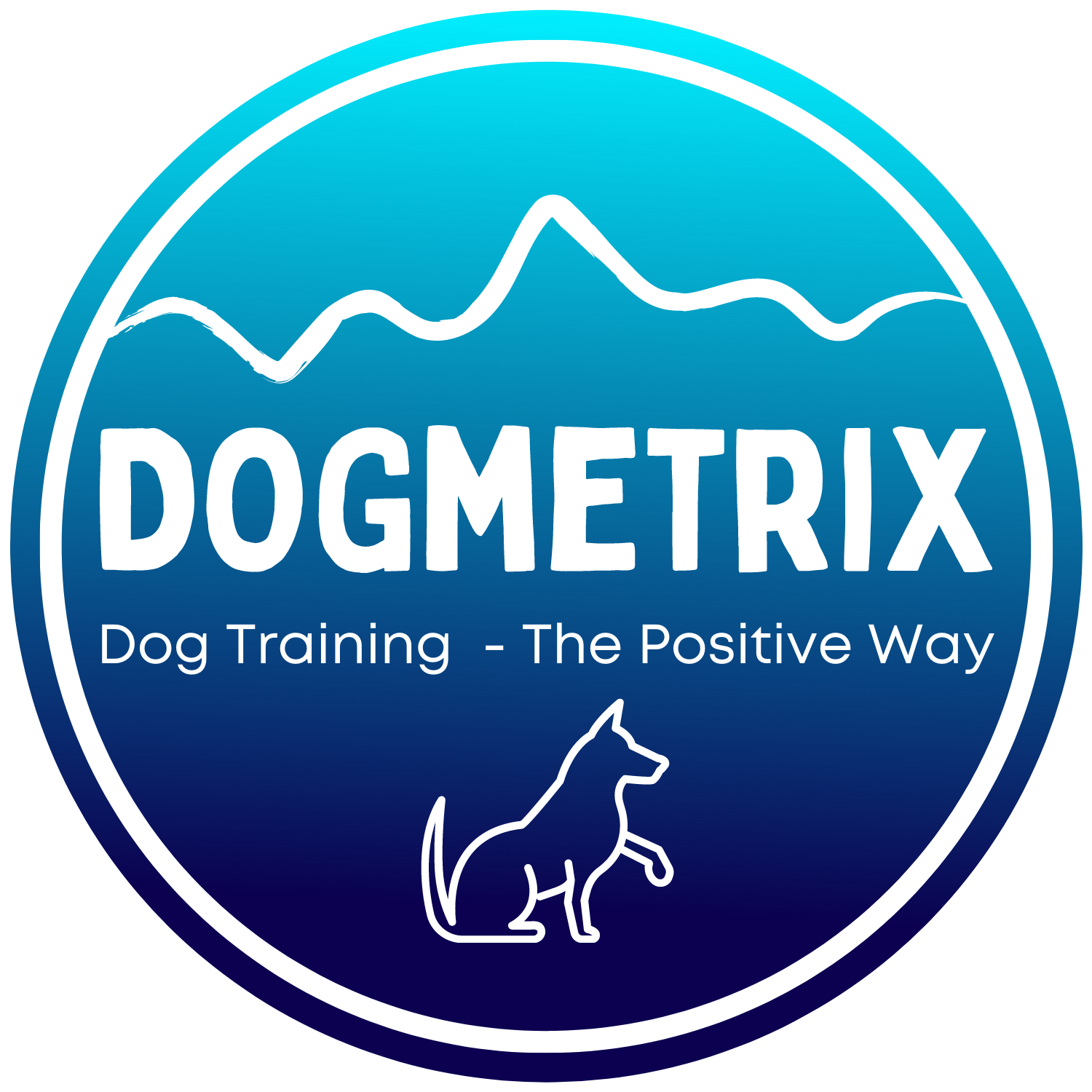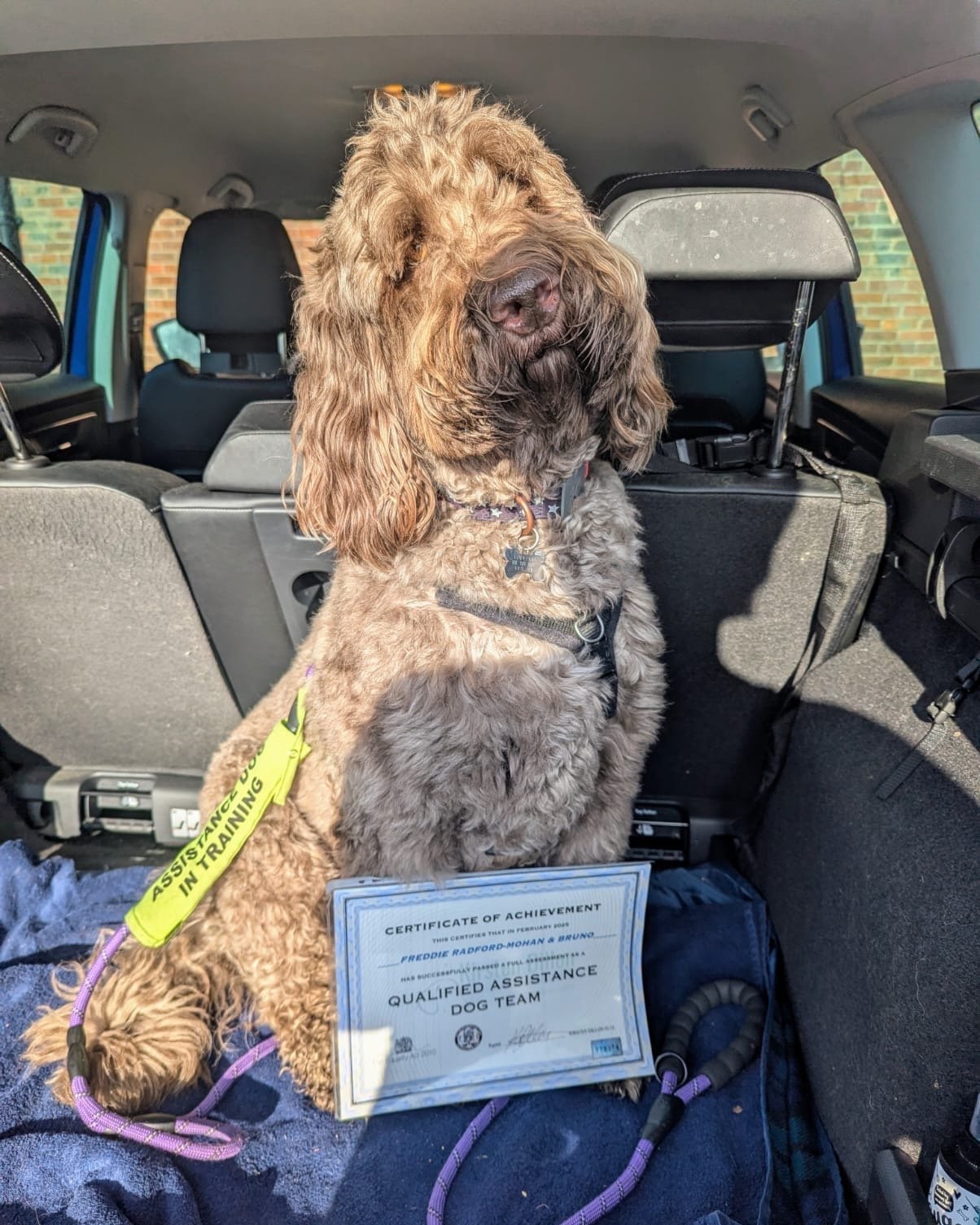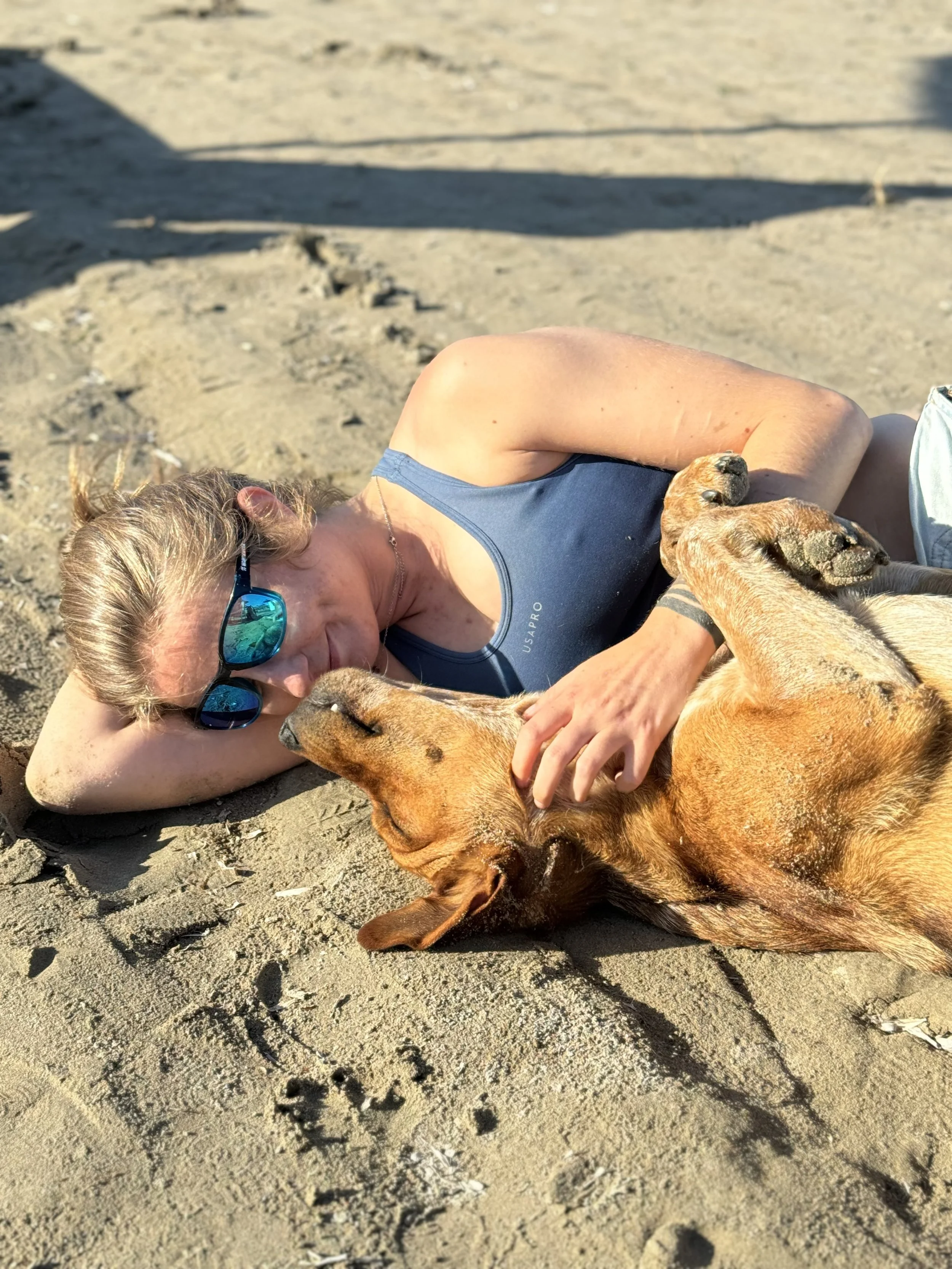OUR AUTISM ASSISTANCE DOG TRAINING:
Dogmetrix specialises in training autism assistance dogs - highly skilled companions that provide life-enhancing support to individuals with autism spectrum disorder (ASD).
These incredible dogs offer more than just companionship, they help reduce anxiety, support social interaction and bring a sense of stability to daily life. For individuals facing sensory processing challenges, an autism assistance dog can be a grounding and calming presence.
Our training programme prepares dogs to perform a range of essential tasks, including deep pressure therapy, tracking and assisting in overwhelming or socially demanding environments. With the right support, these dogs empower their handlers to live with greater confidence and independence.
WHAT MAKES US DIFFERENT:
At Dogmetrix, founder Ciara brings both professional expertise and invaluable lived experience as someone with ADHD and autism herself. This unique perspective allows her to deeply understand the individual needs of autistic children and adults alike. Ciara knows firsthand the incredible impact that dogs can have, sharing her own life with three beloved companions.
Autism support dog training is still a growing field and Dogmetrix is proud to be at the forefront, helping to pioneer this important and life-changing support.
“We found Dogmetrix/Ciara after responding to a post about Autism assistance dogs, and we are so glad we did. After exploring different options, we often felt lost about where to begin. From the moment we met Ciara, she understood our situation instantly. Her empathy and deep understanding of Autism has been invaluable as we embark on the journey of training a puppy to become an assistance dog for our child.”
THE PROCESS:
The autism assistance dog training process involves several key steps, each designed to ensure that the dog can effectively support their handler.
-
The journey begins with finding the right dog to become an autism assistance companion, which doesn’t mean waiting years on a support dog list or relying solely on puppies. We help families and individuals assess and select dogs based on personality, temperament, and compatibility, considering both puppies and older or rescue dogs. While breeds like Labrador Retrievers and Golden Retrievers are commonly chosen for their trainability and calm nature, we focus on the individual dog and how well they align with the specific needs of the person they’ll be supporting. Dogmetrix guides every step of the selection process to ensure the best possible match.
-
Once the right dog has been selected, we focus on building a strong foundation through basic skills training. We create a personalised training plan tailored to both the dog’s learning style and the specific needs of the individual they’ll support. Our 1:1 sessions are designed to be clear, consistent and paced appropriately, ensuring the dog develops essential life skills such as settling in public, calm greetings and focus around distractions. These fundamentals are key to creating a reliable, confident assistance dog and we’re here to guide and support every step of the way.
-
Socialisation is crucial for dogs working with individuals on the autism spectrum. If sourcing a puppy from a breeder, we help assess the litter and provide guidance on early socialisation before the dog even comes home. This includes recommendations for the breeder to expose the puppy to different sights, sounds, handling experiences, and gentle interactions to build a confident, well-rounded foundation.
-
This phase involves training the dog to behave appropriately in public settings. The dog learns to remain calm in the presence of distractions and to follow commands even in chaotic environments. This training is essential for ensuring the dog can effectively accompany their handler throughout daily activities.
This period is crucial for establishing a bond between the dog and the handler, as well as ensuring the dog responds appropriately to the handler's cues and needs.
-
This is a vital stage, where autism assistance dogs undergo specialised training to mitigate the challenges faced by individuals with autism. This includes tasks like interrupting self-harming behaviours, providing deep pressure therapy, creating a safe space and emotional regulation. Each of those is tailored to the client’s specific needs.
-
After the initial training process, ongoing training and support are important. This may include regular refreshers on commands and tasks, as well as support with any behavioural concerns that may arise. Continued training helps maintain the skills learned and adapt to any changing needs of the handler.
FAQs 🐾
-
An autism assistance dog is specially trained to support an autistic person’s unique needs. They can help with tasks like interrupting anxiety behaviours, creating personal space in crowds, alerting to meltdowns or shutdowns, or simply providing calming companionship. Every dog is trained to support the individual they live with.
-
At the moment, I offer owner-led training and support for those training their own dogs as assistance dogs. While I do not provide dogs or accreditations myself, I focus on preparing your dog for public access and task-based work, in line with UK law and best practices.
-
Yes – the UK does not require certification for assistance dogs by law. Instead, dogs must be trained to perform tasks that mitigate a disability and behave safely in public. I help ensure your dog meets these expectations and can provide documentation of their training history to support this.
-
Tasks are personalised to your needs but may include:
Deep pressure therapy
Creating space in queues
Guiding to exits or safe spaces
Interrupting repetitive behaviours
Reminders to take medication
Fetching items or responding to alarms
We’ll explore which tasks are meaningful and achievable for you and your dog together.
-
Not every dog is suitable for this work. It depends on their temperament, health, age, and ability to learn. I offer initial assessments to help you decide if your current dog is a good candidate, or support in choosing a suitable puppy or rescue to train.
-
I offer puppy assessments and training plans to help increase the chances of your puppy becoming a successful assistance dog. You’ll get tailored guidance, regular check-ins, and early socialisation and confidence-building work.
-
Yes. I’m autistic and ADHD myself, and my training is designed to be neurodivergent-friendly. Sessions are paced gently, with plenty of flexibility and understanding. We can communicate in the way that works best for you – including email summaries, quiet sessions, and visual supports.
-
This depends on your goals and capacity. Some clients see me weekly or more, others every few weeks or monthly. I also offer online support in between to reduce overwhelm and help you stay on track at your pace.
-
No problem! I offer online consultations and training support via video call or voice notes, depending on what works best for you. I’ll still provide feedback, resources, and task guidance remotely.
-
How do I book or find out more?
You can book a free online consult directly through my appointment’s page or contact me first with any questions through the enquiry page. If you’re unsure where to start, I offer an initial consultation to talk through your needs and goals with no pressure.



